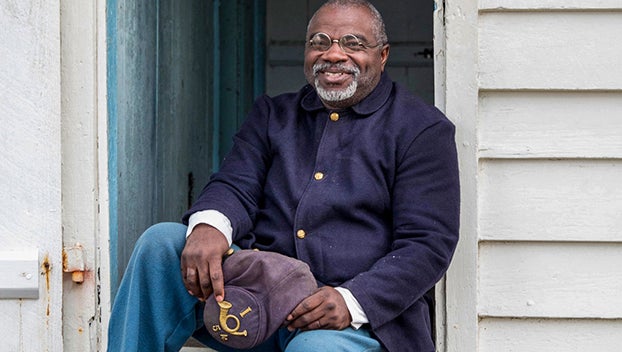Slave Dwelling Project still happening this evening at Natchez’s Auburn
Published 1:14 pm Saturday, April 15, 2023

- Joseph McGill (submitted photo)
|
Getting your Trinity Audio player ready...
|
NATCHEZ — Nationally acclaimed Slave Dwelling Project creator Joseph McGill Jr. will still be hosting campfire discussions this evening at Auburn, minus the campfire as the rain could move the activities inside Auburn, said Historic Natchez Foundation Executive Director Carter Burns.
McGill first brought his Slave Dwelling Project to Natchez in 2021, when he presented a virtual program at Melrose. He returned Friday for a two-day program that included a lecture at the Historic Natchez Foundation and at 6 p.m. tonight, a living history campfire conversation at the Auburn, located at 400 Duncan Ave. Parking is in the rear of Auburn, which is accessed from the second road on the right inside the Duncan Park Gate.
“The Slave Dwelling Project will visit Natchez to encourage the continuation of antebellum historic sites to change their narratives,” said McGill. “This changed narrative now includes the history of all the people, enslaved and free, who were associated with the sites.”
McGill, a recognized authority on slave dwellings, said important questions about the “enslaved are now being answered in the interpretation given at most antebellum sites.” Those questions include: How did the antebellum owners of the properties acquire their wealth? How many people did they enslave? Who physically built the property?
“From the lecture, I want people to know that enslaved people had agency,” McGill said. “Despite what the laws said that they were, and the enslavers thought they were, they were still human. From the campfire conversation, I want the participants to be able to connect the dots to how our founding history continues to influence our current lives.”
McGill said the campfire conversation will focus on slavery and the legacy it left on this nation. “Subjects we discuss but are not limited to include white supremacy, white privilege, historical trauma, Confederate monuments, weddings on plantations, anti-CRT, anti-woke, etc.,” he said.
Burns said he’s looking forward to McGill’s return visit.
“We are thrilled to be hosting Joseph McGill and the Slave Dwelling Project in Natchez,” he said. “We had planned for him to bring the program to town in 2020 but had to cancel the event. We were only able to host a virtual campfire discussion in 2021, so we are happy to have him here in person this year.”
McGill is a history consultant for Magnolia Plantation in Charleston, S.C., and the founder and director of the Slave Dwelling Project. Through the Slave Dwelling Project, he has arranged for people to “sleep in extant slave dwellings,” providing experiences that “brought much needed attention to these often-neglected structures that are vitally important to the American built environment,” McGill said in a biographical sketch.
In addition to giving lectures and educating the public about historic homes and the enslaved, McGill is known for spending nights inside slave quarters throughout the South. In an October 2013 article for Smithsonian Magazine, writer Tony Horwitz noted: “Some travelers dream of five-star hotels, others of visiting seven continents. McGill’s mission: to sleep in every former slave dwelling still standing in the United States.”
Since 2018, McGill has conducted more than 250 overnights in about 100 different sites in 19 states and the District of Columbia. McGill is a descendant of slaves, and his overriding desire is for “individuals and organizations to preserve and mark sites related to the institution of slavery and the legacy of slavery.”
For more information, contact the Historic Natchez Foundation: Call 601-442-2500 or send email to hnf@natchez.org. Information about the Slave Dwelling Project can be found at slavedwellingproject.org.






